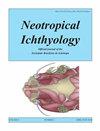Diel feeding activity of Abudefduf saxatilis (Perciformes: Pomacentridae) on southwestern Atlantic reefs
IF 2
4区 生物学
Q1 ZOOLOGY
引用次数: 0
Abstract
Abstract Feeding ecology studies are crucial for understanding energy flow in reef ecosystems. In this study, we used an integrative approach to investigate the diel-feeding ecology of the sergeant-major Abudefduf saxatilis. To examine the possibility of diel-periodicity and size-class differences in foraging behaviour, we tracked fish individuals until their first bite on two subtropical reefs. During each observation, we recorded the substratum that was bitten and estimated the individual’s total length. To assess the diet, we analysed the stomach contents of five individuals from each location. In total, we observed 2,703 individuals biting seven substrates. Our results showed no significant differences in substrate use for diel-periodicity. However, we found significant differences between two size classes. Despite this, both populations tended to forage near the surface in the water column in the morning and on the benthos in the afternoon, although this tendency was not statistically significant. Smaller individuals fed mostly in the water column, while larger individuals foraged on all substrates, likely due to their different energetic demands. Our findings indicate this species has an omnivorous, generalist diet, comprising 12 items from both benthos and plankton. The lack of differences in diel-periodicity is likely due to the sergeant-major’s opportunistic behaviour.西南大西洋暗礁上沙螺的日采食活动
摄食生态学研究是了解珊瑚礁生态系统能量流动的关键。在这项研究中,我们采用综合方法调查了中士少校Abudefduf saxatilis的饮食生态。为了研究觅食行为中饮食周期性和大小类别差异的可能性,我们跟踪了鱼类个体,直到它们在两个亚热带珊瑚礁上咬第一口。在每次观察中,我们记录被咬的基质并估计个体的总长度。为了评估饮食,我们分析了来自每个地点的五个人的胃内容物。我们一共观察到2703只蚊子叮咬7种基质。我们的结果显示,在基材的使用上没有显著的差异。然而,我们发现两个大小类别之间存在显著差异。尽管如此,两个种群都倾向于上午在水柱表面附近觅食,下午在底栖动物上觅食,尽管这种倾向在统计上并不显著。较小的个体主要在水柱中觅食,而较大的个体则在所有基质上觅食,这可能是由于它们的能量需求不同。我们的研究结果表明,这个物种是杂食性的,饮食广泛,包括12种底栖动物和浮游生物。饮食周期没有差异可能是由于军士长的机会主义行为。
本文章由计算机程序翻译,如有差异,请以英文原文为准。
求助全文
约1分钟内获得全文
求助全文
来源期刊

Neotropical Ichthyology
生物-动物学
CiteScore
2.80
自引率
17.60%
发文量
24
审稿时长
6-12 weeks
期刊介绍:
Neotropical Ichthyology is the official journal of the Sociedade Brasileira de Ictiologia (SBI). It is an international peer-reviewed Open Access periodical that publishes original articles and reviews exclusively on Neotropical freshwater and marine fishes and constitutes an International Forum to disclose and discuss results of original research on the diversity of marine, estuarine and freshwater Neotropical fishes.
-Frequency: Four issues per year published only online since 2020, using the ‘rolling pass’ system, which posts articles online immediately as soon as they are ready for publication. A searchable and citable Digital Object Identifier (DOI) is assigned to each article immediately after online publication, with no need to await the issue’s closing.
-Areas of interest: Biology, Biochemistry and Physiology, Ecology, Ethology, Genetics and Molecular Biology, Systematics.
-Peer review process: The Editor-in-Chief screens each manuscript submitted to Neotropical Ichthyology to verify whether it is within the journal’s scope and policy, presents original research and follows the journal’s guidelines. After passing through the initial screening, articles are assigned to a Section Editor, who then assigns an Associate Editor to start the single blind review process.
 求助内容:
求助内容: 应助结果提醒方式:
应助结果提醒方式:


